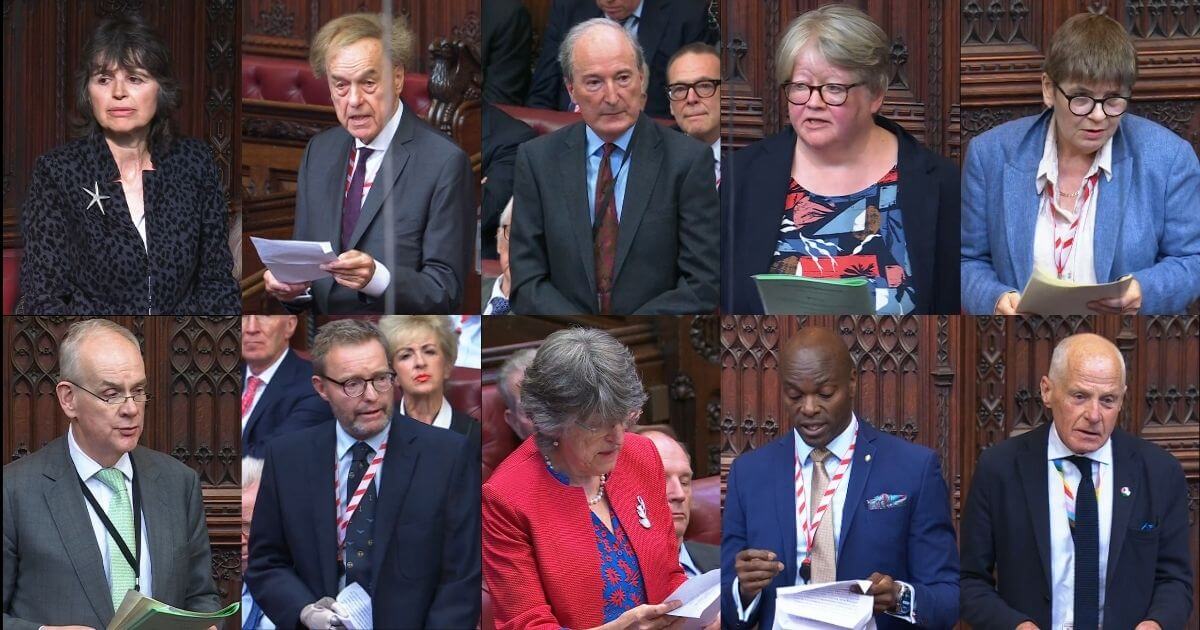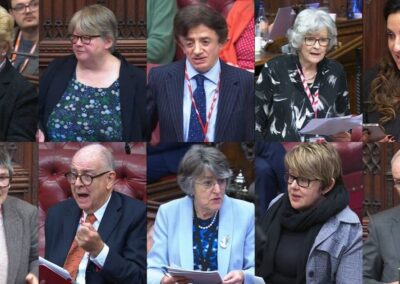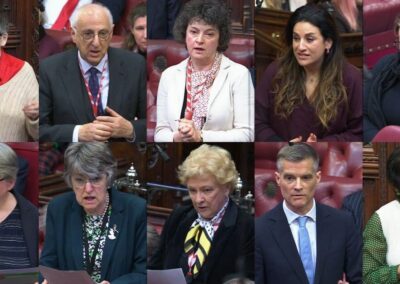The second day of Second Reading of the assisted suicide Bill in the House of Lords took place on Friday, 19 September, with almost two-thirds of Peers who took a position on the Bill speaking against it.
Across both days one and two of Second Reading, of the 155 Peers who took a stance on the Bill, 104 (67%) spoke in opposition and 51 (33%) spoke in favour.
In a significant win for opponents of the assisted suicide Bill, the House of Lords has approved the establishment of a dedicated select committee to further scrutinise the Bill’s proposals, with the commencement of the Bill’s formal Committee stage being delayed until the select committee has reported.
Baroness Berger tabled an amendment that delayed the commencement of the Bill’s Committee stage until a select committee had reported. This was initially branded by supporters of the Bill as a “wrecking amendment” and dismissed by the Bill’s lead House of Lords sponsor, Lord Falconer, as not “workable”.
On Wednesday last week, however, in a significant U-turn, Lord Falconer made a major concession, agreeing that he would now back a new amendment tabled by Baroness Berger that would, in fact, still delay the commencement of the Bill’s Committee Stage until a select committee had reported.
This has been called a “significant win” for opponents of the Bill by Politico Playbook. Commentators have said this clearly showed that Falconer and supporters did not have the numbers to vote down the amendment, and so conceded.
Peers reiterate the necessity of safeguarding vulnerable people
The defining theme of the day was the lack of safeguards in the Bill for vulnerable people. Lord Curry of Kirkharle warned starkly about a culture shift that legalising assisted suicide would bring. Referencing an article written by former Member of Parliament, Matthew Parris, Curry highlighted how some believe that “the elderly and infirm are a drain on resources”, and so it would be “a good thing” for them to end their lives through assisted suicide. To this end, he argued that legalising assisted suicide would lead to “an economic evaluation of human life”.
Lord Curry continued, noting how “the scope for eligibility continues to be expanded” in Canada, where ‘assisted dying’ is already a money-saving scheme, reiterating how legalising assisted suicide hands the state power to cut costs at the expense of vulnerable lives.
This thread was picked up repeatedly throughout the debate, with some Peers noting that the money-saving argument could be utilised by families as well as the state. Lord Robathan highlighted the potential real-world consequences, warning that families under strain could be tempted toward encouraging “a decaying relative to go for assisted suicide to avoid care home bills”.
Lord Jopling gave a moving speech on how his mother battled illness and depression in her later years, but with care and support from her family, she lived to be 96 years old, highlighting how vulnerable people deserve help to live, not to die.
Assisted suicide campaigner Lord Falconer has to issue apology
Lord Falconer, the Bill’s sponsor in the House of Lords, had to issue an apology to the House for failing to mention that the pro-assisted suicide pressure group Dignity in Dying funded the printing of literature he sent to Peers.
This appeared to follow a pattern, as Kim Leadbeater, the sponsor of the Bill in the House of Commons, also had to apologise to the House for falsely suggesting that any of the serving judiciary supported her Bill.
Peers warn against the drift towards utilitarianism
A powerful philosophical caution came from Lord Frost, who warned that the logic of the Bill trends towards a utilitarianism in which lives are weighed and traded. He highlighted how the “ultimate destination” of this reasoning is utilitarianism, and “none of us” would be safe in a state that had “no free-standing, inherited moral principles of any kind”.
Lord Grade of Yarmouth highlighted the effects that legalisation would have, especially as the assisted suicide Bill, like all legislation, “will not be perfect when enacted. In real life, it is certain to prove defective in some unforeseeable ways. Unlike other legislation, there is no redress – certainly not from the graveyard”.
Several Peers mentioned the subversion that this legislation would have on the purpose of medical practitioners. Lord Truscott commented that “the Hippocratic oath has been a foundational code of medical ethics, and the principle ‘do no harm’ has been a central tenet for all those years”.
Baroness Fox also pointed out how legalising assisted suicide will overturn our understanding of medical ethics and “shakes the foundations of society’s attitudes to suicide”, lamenting “how many norms the Bill will overturn”.
Expansion of the law a key worry among Peers
As in the previous debate, Peers were again worried about the slippery slope of assisted suicide, based on the numerous international examples of the law quickly expanding once initial legalisation has happened.
Lord Mackinlay pointed to overseas examples to address the claim that this time would be different. He set out five reasons to reject the Bill, including pointing out that in “Belgium, children as young as nine are being euthanised under similar legislation”. Former Deputy Prime Minister Baroness Coffey added weight to this criticism by highlighting that the promoters of the assisted suicide Bill actually wanted doctors to be able to raise assisted suicide with children.
Mackinlay criticised Lord Falconer’s claim that only 1% of deaths in England and Wales would be as a result of assisted suicide after ten years, pointing out that his claim “does not fit very well with Australia’s 3% and Canada’s just under 5%”.
Criticisms abound of Government’s support for Bill, despite claims of neutrality
Lord (John) Patten criticised what he described as “the increasingly strange and weird” degree of “overt” Government help for a Private Member’s Bill on a conscience issue, contrary to its professed neutrality. Lord Mackinlay agreed with this sentiment, arguing that the assisted suicide Bill is “quite obviously a government Bill in disguise”.
Bill is very much about “suicide”, rather than “assistance”
Highly respected journalist Charles Moore, who now sits in the House of Lords, praised those who work to prevent suicides from occurring where he lives. Assisted suicide, he said, would effectively be the “opposite” of that, as those he praised “try to persuade those who have come to die to live”. Lord Moore went on to highlight how the Bill would not simply give individuals the freedom to end their lives, which they already have, but would confer “a right to kill yourself with the active assistance of the state and doctors, and at public expense”.
Lord Moylan highlighted other examples of doublespeak within the text of the Bill. He pointed out that “the words ‘death’ and ‘dying’ hardly appear”, while the “poison” is referred to only as an “approved substance”, and that the actual act of ending a life is referred to only as the “Provision of assistance”. He claimed that these clear examples of euphemism deliberately obscure the realities of assisted suicide and attempt to hide many of the flaws of the Bill.
Lord Harper also called on Peers to be honest about the language they use to describe the assisted suicide Bill and what it entails, stating, “[T]his is about assisted suicide. We are amending the Suicide Act to provide a defence for people taking their life. If the promoters of the Bill and those who support it find plain and clear language uncomfortable, rather than attacking those that use that plain and clear language, as they have done with my noble friend Lady May, they should perhaps reflect upon what it is they wish to do”.
Peers reiterate that the Bill should be rejected to protect vulnerable people
Lord Bailey of Paddington opposed the Bill “with deep concern” out of fears “that it will place the most vulnerable at the greatest risk”. He warned that far from helping vulnerable people, the assisted suicide Bill would make them even more vulnerable. Lord Bailey ended his speech to a resounding murmur of support from the House, stating, “We must choose life over fear”.
One of the most emotive speeches of the day came from Lord Shinkwin, a Peer with a disability, who called the Bill “the stuff of nightmares”, saying, “There are savings to be made should assisted dying be introduced. This Bill effectively puts a price on my head”.
Lord Shinkwin continued, saying that should the Bill “become law and precedents set elsewhere apply in the UK over time, I face the realistic possibility, as a severely disabled person, of being killed as a result of legislation passed by this House”.
Shinkwin also highlighted the spoken contribution of former Prime Minister, Theresa May, who now sits in the House of Lords, in which she referred to the Bill as “the ‘Licence to Kill Bill’”. He said that Baroness May “is right: it gives the state a licence to kill the wrong type of people. I am the wrong type”.
Baroness Parminter also highlighted concerns about the Bill, stating, “Vulnerable lives must be protected”. She outlined how it currently places people with eating disorders at risk. In other countries, people with anorexia have been approved for assisted suicide.
Palliative care must be better funded, Peers argue
Many of those who spoke in the debate reiterated calls for an increase in funding for palliative care, as an essential part of caring for society’s most vulnerable people, rather than encouraging them to end their lives.
Baroness Stroud said: “I believe that this country can be better than this”. She argued that “the palliative care we provide for those who are terminally ill could be developed so that we become a world leader” in providing it, stating that we need to do more for vulnerable people.
Lord Beith warned that a potential outcome is a system where assisted suicide is broadly available, fully funded on the NHS, but palliative care is not. Baroness Hollins, a former President of the Royal College of Psychiatrists and a leading voice for people with a learning disability, pointed to evidence from the Association of Palliative Medicine which shows “that growth in palliative care slows in countries with assisted dying services”.
Baroness Finlay, a professor of Palliative Medicine, also highlighted that there are many flaws in the Bill which will likely cause countless unnecessary deaths, asking, “How many wrongful deaths a year is acceptable”?
Lord Alton unable to attend after London bus crash
One high-profile member of the House of Lords who was not present for Second Reading was Lord Alton of Liverpool. Lord Alton was recently involved in a London bus crash in Victoria, where he suffered spinal injuries, so was not able to speak in the debate. In place of being able to give a speech, he recorded a video of the speech he would have given at Second Reading, which is shown below (full transcript here).
Spokesperson for Right To Life UK, Catherine Robinson, said “The large majority of Peers speaking in opposition to the Bill at Second Reading suggests the House of Lords is currently significantly more opposed than supportive of the Bill. Given that the House of Lords can reject the Bill, the Bill is increasingly looking like it will never become law”.
“The establishment of a dedicated select committee to further scrutinise the Bill’s proposals is a big win for opponents of the assisted suicide Bill. It’s clear that Falconer and his supporters knew they did not have the numbers to vote down the amendment, and so conceded”.
“Vulnerable people in our society need our unwavering protection and the best quality care, not a pathway to assisted suicide. Evidence from abroad shows that, if this legislation becomes law, large numbers of vulnerable people nearing the end of life would be pressured or coerced into ending their lives”.












